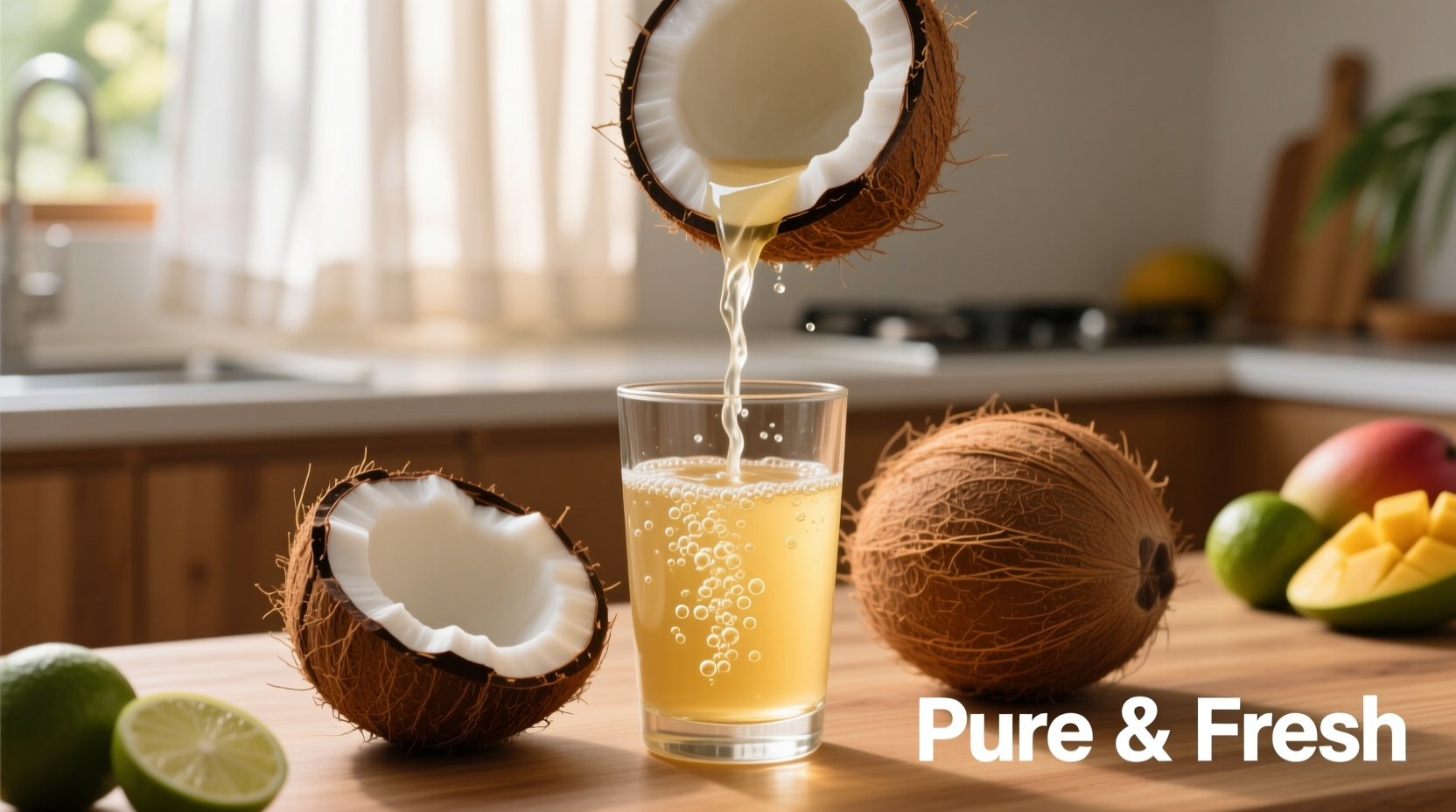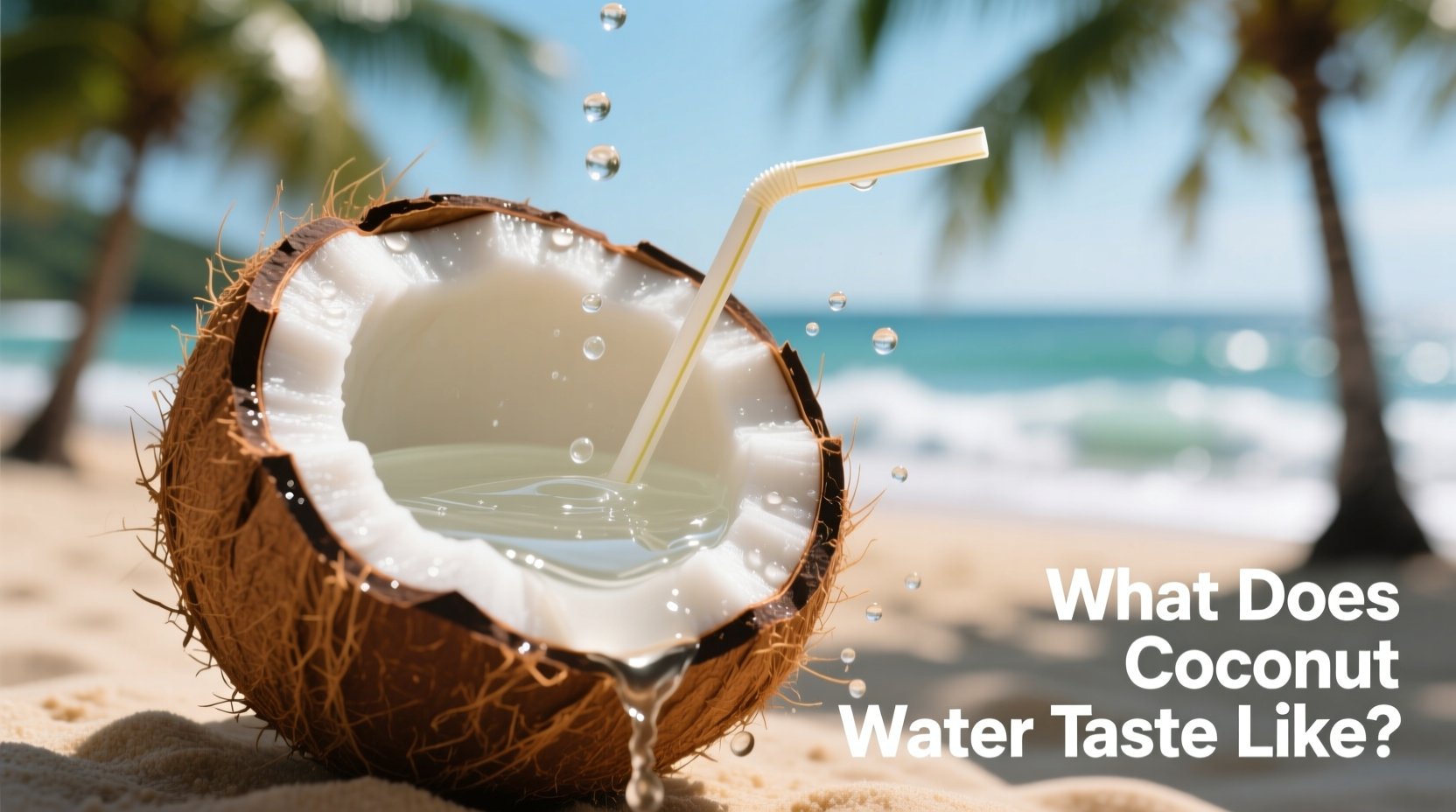Coconut water tastes mildly sweet with subtle nutty notes, a refreshing lightness, and a clean finish—like a natural sports drink with hints of tropical fruit and a barely-there floral aroma. Fresh young coconuts offer the purest flavor, while packaged versions vary based on processing and additives.
Decoding the Flavor Profile: What to Expect When You Sip
When you first taste pure coconut water, you'll notice its delicate sweetness—about half as sweet as apple juice but without the intense fruitiness. It has a clean, slightly vegetal quality similar to cucumber water, with a whisper of nuttiness that distinguishes it from plain water. The texture is remarkably light, almost watery, with no oily residue (unlike coconut milk).
Professional flavor chemists at the University of Florida's Tropical Research Institute describe its sensory profile as having "low viscosity, neutral pH (5-6), and a balanced composition of natural sugars (primarily glucose and fructose) that creates a refreshing mouthfeel without cloying sweetness." This scientific analysis explains why coconut water feels hydrating rather than heavy.
Fresh vs. Packaged: How Processing Changes the Taste
Your first encounter with coconut water matters. Fresh from a green young coconut, it delivers:
- Crisp, clean flavor with subtle floral notes
- Natural sweetness around 3-5% Brix (sugar content)
- Noticeable electrolyte tang from potassium
- Faint tropical fruit undertones
Pasteurized or shelf-stable versions often show flavor differences due to processing:
| Processing Method | Taste Impact | Common Additives |
|---|---|---|
| Flash pasteurization | Slight cooked flavor, reduced freshness | None (usually) |
| Heat sterilization | Noticeable caramelization, darker color | Ascorbic acid (vitamin C) |
| Concentrate reconstitution | Flattened flavor profile, less complexity | Natural flavors, sweeteners |
According to USDA FoodData Central analysis, processed coconut water typically contains 4.5g of sugar per 100ml compared to 3.7g in fresh coconut water, explaining why some packaged versions taste noticeably sweeter.
Coconut Water vs. Coconut Milk: Clearing the Confusion
Many consumers confuse these two coconut products. Here's how their taste profiles differ dramatically:
- Coconut water: The clear liquid inside young coconuts - light, refreshing, slightly sweet
- Coconut milk: Made by blending coconut flesh with water - rich, creamy, intensely coconut-flavored
Think of coconut water as nature's electrolyte beverage, while coconut milk functions as a cooking ingredient with fat content around 15-20% (compared to coconut water's negligible 0.2g fat per 100ml).

What Affects Coconut Water's Flavor?
Several factors create variation in taste experience:
Maturity of the Coconut
Young green coconuts (6-7 months) produce the sweetest, most refreshing water. As coconuts mature to brown stage (12+ months), the water becomes less sweet and the flesh thickens—perfect for making coconut milk but less ideal for drinking.
Geographic Origin
Coconut varieties differ globally:
- Thailand: Slightly sweeter with floral notes
- Brazil: More neutral, clean profile
- Philippines: Noticeable mineral tang
- Caribbean: Fruitier, almost pineapple-like notes
A 2023 sensory study published in the Journal of Food Science found statistically significant flavor differences between coconut waters from different regions, with Thai varieties scoring highest for overall flavor acceptability.
Storage and Temperature
Serving temperature dramatically affects perception:
- Cold (4°C/39°F): Maximizes refreshment, minimizes any vegetal notes
- Room temperature: Enhances subtle floral aromas but may reveal off-notes in lower-quality products
When Coconut Water Tastes 'Off'—And Why
Sometimes coconut water disappoints. Here's what causes common flavor issues:
- Sour or fermented taste: Indicates spoilage (fresh coconut water should have pH 5-6)
- Excessively sweet: Often means added sugars or use of overripe coconuts
- Bitter aftertaste: Can come from contact with coconut husk during processing
- Metallic notes: Usually from improper canning or storage containers
The International Food Information Council notes that properly processed coconut water should maintain its characteristic fresh flavor for 12-18 months when shelf-stable, but quality declines noticeably after 9 months.
Practical Tips for the Best Taste Experience
Follow these chef-tested recommendations for optimal flavor:
- Choose products labeled "100% coconut water" without added sugars or flavors
- Refrigerate after opening and consume within 3-5 days
- Chill to 40°F (4°C) before serving for maximum refreshment
- Add a squeeze of lime to enhance natural sweetness without extra sugar
- Look for "not from concentrate" on the label for better flavor integrity
Common Misconceptions About Coconut Water Taste
Let's clear up frequent misunderstandings:
- Myth: Coconut water tastes like coconut flavoring or extracts
Reality: Artificial coconut flavor is much stronger and sweeter than natural coconut water - Myth: All coconut water tastes the same
Reality: Flavor varies significantly by brand, processing method, and origin - Myth: The pink color means it's gone bad
Reality: Some varieties naturally turn pink due to antioxidant reactions (perfectly safe)
How Professional Tasters Evaluate Coconut Water
Food scientists use specific criteria when assessing quality:
- Brightness: How clean and refreshing the initial taste feels
- Balance: Harmony between sweetness, acidity, and mineral notes
- Finish: Absence of unpleasant aftertastes
- Authenticity: How closely it matches the profile of fresh coconut water
At culinary institutes like the Culinary Institute of America, students learn to identify high-quality coconut water by its "crisp mouthfeel and absence of cooked or caramelized notes"—indicating minimal processing.
Your Coconut Water Taste Journey
Understanding what coconut water tastes like helps you make informed choices. Whether you're seeking hydration after exercise, a natural electrolyte source, or simply a refreshing beverage alternative, knowing what to expect enhances your experience. The best way to discover your preference? Try several varieties chilled and judge for yourself—which brings us back to that initial sip: light, subtly sweet, and unmistakably tropical.











 浙公网安备
33010002000092号
浙公网安备
33010002000092号 浙B2-20120091-4
浙B2-20120091-4